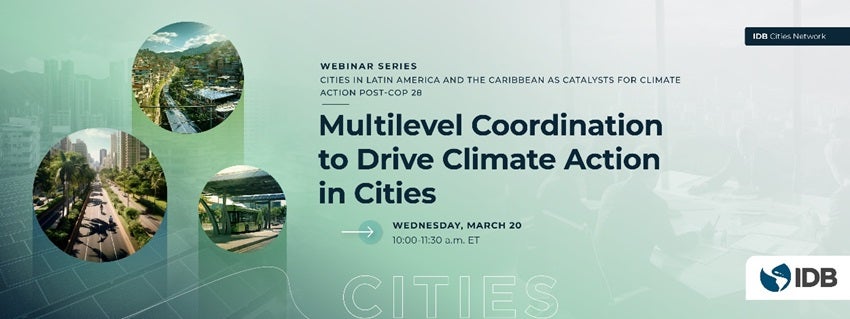Este artículo está también disponible en / This post is also available in: Spanish
The Housing and Urban Development Division organized three webinars to support cities in their efforts to understand the opportunities and challenges of subnational climate action in the fight against climate change and in achieving national and global goals and commitments.
Our first webinar, held on March 20th, delved into the crucial role of multilevel collaboration in driving climate action within cities. If you missed it, you can catch the recording here.
The key elements discussed cover the following:
- Opportunities for Cities in NDCs Update: Updating Nationally Determined Contributions (NDCs) for 2025 presents a unique opportunity for cities in the region to enhance their involvement in climate action. By aligning local strategies with national and international goals, cities can embed specific targets for emissions reduction, climate change adaptation, and urban resilience promotion into updated NDCs. This process not only streamlines the allocation of financial and technical resources for local climate-smart projects but also fosters sustainable development and climate change mitigation within urban areas.
- Cities at the Forefront of the Global Climate Agenda: At COP28, cities’ significant role in the global climate agenda was highlighted. Over 70 national governments pledged to promote collaborative efforts between national and subnational levels through the CHAMP (Coalition of High Ambition Multilevel Partnership) Initiative. This decentralized approach is vital for overcoming financial barriers and fostering multinational collaboration at the city level. Furthermore, the presence of COP’s secretary-general in an official city-focused meeting during COP28 underscores the growing recognition of cities’ contributions to climate action. Throughout 2024, a series of subnational governments’ gatherings in Belem, Sao Paulo, and Rio de Janeiro will continue to emphasize the role of cities in combating climate change.
- Challenges and Opportunities in Multilevel Coordination for Resilient Cities: During the panel discussion, the importance of addressing multilevel coordination in the development of Climate Action Plans was highlighted. It is essential to align budgets and financial resources with national climate planning and ensure an effective allocation at the municipal level. Greater synergy between subnational and national entities and regulatory and parliamentary adaptations is essential for fostering structural collaboration. Effective coordination across different government levels is particularly crucial for implementing large-scale projects in areas like mobility, adaptation, and water management that require national program development and financing for successful execution.
Case Study: Multilevel Coordination in Valdivia, Chile’s Climate Change Plan
Valdivia, Chile’s Communal Climate Change Plan stands out for its successful multilevel coordination between the Regional Government, the Ministry of Environment, and the municipality. This approach addressed climate challenges comprehensively, involving various governmental and social entities. Participation mechanisms, such as the climate environmental table, were established, bringing together key actors to develop mitigation and adaptation strategies. This coordination strengthened the plan and promoted a holistic and sustainable vision of Valdivia’s climate planning development.
Conclusions
In summary, the cases presented highlight the vital role of multilevel coordination in the fight against climate change. From municipal planning in Valdivia, Chile, to broader regional and global initiatives led by organizations such as the Inter-American Development Bank, NDC Partnership, C40, and ICLEI, it is clear that effective climate action requires collaboration between different scales of government. This coordination facilitates strategy integration, maximizes resources, and promotes a more robust and adaptive response to climate challenges. As we move towards a more sustainable future, we must continue promoting collaboration between different levels of government and capitalize on the momentum generated by initiatives like CHAMP. Ultimately, there is a need for holistic and collaborative approaches to address the climate crisis and build a sustainable future for all.


Leave a Reply